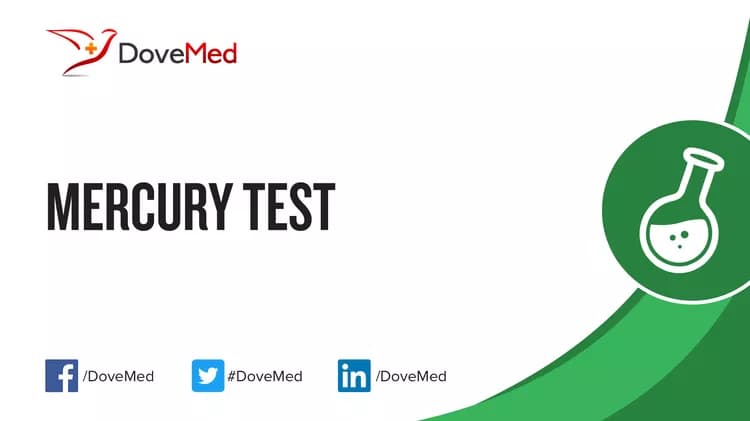What are the other Names for this Test? (Equivalent Terms)
- Blood Mercury Test
- Hg Test
- Urine Mercury Test
What is Mercury Test? (Background Information)
- Mercury (Hg) is a heavy metal that exists in elemental, organic, and inorganic forms
- Elemental mercury may be used in dental fillings and is found in batteries and thermometers
- The inorganic form may be used in antiseptics or skin-lightening creams. The most common form of organic mercury ‘methyl mercury’ is found in fish, such as sharks and king mackerel
- Mercury exposure can be toxic; the toxicity depending on how much mercury is absorbed by the body. This is influenced by the exposure time, amount, and form of mercury. The organs, mainly affected by mercury, are the kidneys and the brain
Mercury Testing is used to examine the levels of mercury in blood, urine, and rarely, in hair.
- Blood can be tested to detect methyl mercury. Although, other forms of mercury may also be tested in blood, their amounts decrease by 50%, every 3 days
- Urine sample may be used to detect inorganic and organic forms of mercury
- Hair testing is a complex procedure and used infrequently. It can be used to detect mercury exposure in the past
What are the Clinical Indications for performing the Mercury Test?
The clinical indications for Mercury Testing include:
- Symptoms of acute mercury poisoning, such as:
- Burning sensation in the mouth and lungs
- Difficulty breathing, fast heartbeat
- Nausea, vomiting, and diarrhea
- Decrease in urine production
- Symptoms of long-term exposure to mercury, such as:
- Problems with vision, hearing, smell and taste
- Mood disturbances
- Tremors and difficulty walking
- Monitoring individuals with occupational exposure to mercury, or such other hazardous materials
How is the Specimen Collected for Mercury Test?
Sample required: Blood/urine/hair
Process:
- Blood sample is drawn through a needle inserted into the vein (arm)
- A urine sample may be collected randomly, or over a 24-hour period, with refrigeration in between the collections
Preparation required: None
What is the Significance of the Mercury Test Result?
The normal levels of mercury, called the reference range for mercury, may vary slightly from lab to lab. Hence, most lab reports come with a reference range, which is used in that particular centre. A physician interprets the results based on the reference values provided.
- Normally, the blood level of mercury is below 10 ng/mL (nanogram/milliliter); it varies between 0-9 ng/mL
- Elevated levels, found on testing, indicate mercury exposure. Elevated blood levels suggest that the exposure has occurred in relatively recent times
- An estimate of past exposure to inorganic and organic forms of mercury can be obtained, from a 24-hour urine sample
The laboratory test results are NOT to be interpreted as results of a "stand-alone" test. The test results have to be interpreted after correlating with suitable clinical findings and additional supplemental tests/information. Your healthcare providers will explain the meaning of your tests results, based on the overall clinical scenario.
Additional and Relevant Useful Information:
- The U.S. FDA recommends that pregnant or nursing mothers and women planning to have children avoid eating seafood, such as sharks, king mackerel, swordfish, and tilefish, in view of the high mercury levels that may be found in them. However, salmon, shrimp, or canned light tuna, may be consumed
- Contrast material, such as gadolinium (used as contrast for MRI scans) and iodine (used as contrast for CT scans) may interfere with tests for metals
Certain medications that you may be currently taking may influence the outcome of the test. Hence, it is important to inform your healthcare provider, the complete list of medications (including any herbal supplements) you are currently taking. This will help the healthcare provider interpret your test results more accurately and avoid unnecessary chances of a misdiagnosis.
Related Articles
Test Your Knowledge
Asked by users
Related Centers
Related Specialties
Related Physicians
Related Procedures
Related Resources
Join DoveHubs
and connect with fellow professionals


0 Comments
Please log in to post a comment.